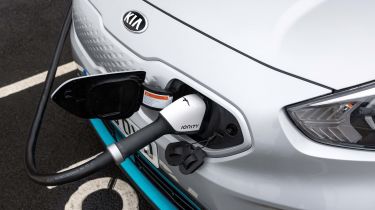Kia e-Niro (2018-2022) range, battery & charging
If our experience of living with the Hyundai Kona is anything to go by, the longer-range version of the Kia e-Niro should do 260 miles in normal use
| Battery size | Range | Wallbox charge time | Rapid charge time |
|---|---|---|---|
| 39kWh | 180 miles | 6hrs 30mins (7.2kW, 0-100%) | 43mins (50kW, 10-80%) |
| 64kWh | 282 miles | 10hrs 30mins (7.2kW, 0-100%) | 44mins (77kW, 10-80%) |
The Kia e-Niro impressed us when we ran one as a long-term test car, because it was able to match its claimed range of 282 miles in normal driving – we didn't have to drive slowly or avoid motorways to get the advertised figure in our 64kWh test car.
Initial tests suggest the 39kWh model is just as good in this respect, so you can be more relaxed about the range that's really available. The 39kWh model has a 180-mile claimed range, which is less than some cheaper, smaller electric cars can manage (a Vauxhall Corsa-e can do well over 200 miles, for example) but could still be an option for short-distance family transport, and it's just as practical as the long-range version.
Kia e-Niro range
The Kia e-Niro’s headline 282-mile official range applies for the 64kWh model, while the 39kWh model added to the line-up in 2020 has a 180-mile range. Expect those figures to drop in winter, as with all electric cars, or if you do a lot of motorway miles as higher speeds drain the battery faster. If you spend all your time at low speed, you're even more likely to reach the claimed range for each model.
Charge time
Charging is as straightforward as it gets: you use a CCS or Type 2 cable that fits into a port in the car’s nose. The car comes with a Type 2 charging cable for public points and a three-pin plug for use with a domestic socket. But as with any electric car with a battery this big, charging using the latter method will be extremely slow, with a full top-up taking nearly 30 hours, or 18 hours for the smaller 39kWh battery.
A 7.2kW home wallbox will do the same in around six-and-a-half hours, while a 50kW rapid charger will give you an 80% charge in around 45 minutes. The larger-battery 64kWh model takes 10 hours to top up from a home wallbox, but as it has a faster rapid-charging speed than the 39kWh car, their 10-80% charge times from one of those chargers is almost identical.
